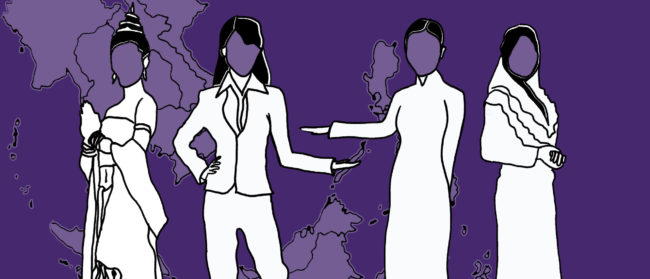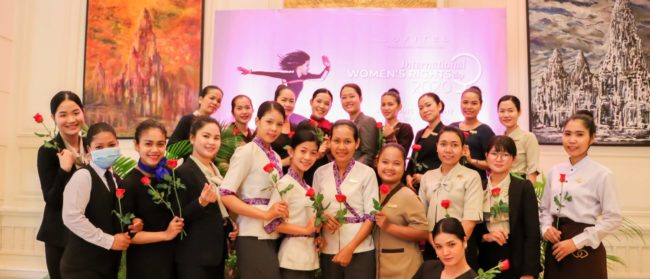Chak Sopheap is the executive director at the Cambodian Center for Human Rights. This article has been researched and written as part of our Recognising Resilience campaign. Read more stories here.
On March 8, Cambodia celebrated International Women’s Day, as we have for the last 25 years, with an official public holiday. Marked by celebrations and events across the country, International Women’s Day champions the women in our community, and celebrates their diversity, strengths and achievements – something society at large often neglects to do.
However, in reality Cambodia’s celebration of women’s rights is superficial. Our society’s treatment of women continues to be problematic, and in order to achieve meaningful gender equality in Cambodia, significant societal reform is necessary.
This year’s International Women’s Day theme was “Generation Equality, Realising Women’s Rights”. The social expectations and attitudes that are harming women in our community do not reflect this vision of equality, nor do they result in the upholding of women’s rights, and it is time we confront this issue. We have a persistent problem with gender-based discrimination and violence, a culture of blaming women for the violence against them, and a practice of silencing or harassing those who stand up for the rights of women.
This year International Women’s Day was celebrated widely across Cambodia. One of these celebrations was an event organised collaboratively by multiple civil society organisations, including the Cambodian Center for Human Rights (CCHR), at Freedom Park in Phnom Penh. Despite the event being authorised by City Hall, authorities restricted the tent construction at Freedom Park, only permitting four blocks of 4×6 metre tents instead of the 20×20 metre tent intended.
This arbitrary restriction resulted in some of the 400 participants sitting or standing in direct sun. Such actions by the Royal Government of Cambodia (RGC) to limit the celebration of International Women’s Day and deter citizens from assembling illustrates the RGC’s shallow and superficial efforts to achieve gender equality. In order to uphold the rights of women the RGC must redouble its efforts and ensure that gender equality is prioritised, starting with refraining from fettering events that aim to celebrate women and inform them of their rights.
The prime minister was quoted saying women who wear ‘sexy outfits’ and revealing clothing ‘provoke sexual desires among men, leading to sexual violence and human trafficking.’ These comments belittle women’s rights to bodily autonomy and self-expression
This year on February 17, at the annual meeting of the Cambodian National Council for Women, Prime Minister Hun Sen criticised women who sell products online by promoting their appearance or by wearing revealing clothing. The prime minister claimed these women damage “morality, traditional Khmer women’s values, and Khmer culture”.
Notably, the prime minister was quoted saying women who wear “sexy outfits” and revealing clothing “provoke sexual desires among men, leading to sexual violence and human trafficking”. These comments from Hun Sen belittle women’s rights to bodily autonomy and self-expression, and place blame on women for the violence committed against them rather than on the perpetrators of the crime.
This highlights the continued failure of the Cambodian government to take gender-based violence and women’s rights seriously and underscores the culture of victim-blaming that has been fostered in our community.

The CCHR and Cambodian civil society have repeatedly called out instances of victim-blaming by officials with little response or commitment by the government for improvement.
For example, in 2012 the CCHR and other civil society organisations called in an open letter for officials to take action and dismiss Phnom Penh’s deputy police chief due to his unacceptable, facetious and offensive reaction to a lawsuit against him relating to his role in the miscarriage of a female protestor who was kicked in the stomach by a member of his police force. The official was quoted as saying, “Is the victim old or young, and does she sue me to return her kid? I want to tell her that if she wants to get back her kid, I am also young”.
In 2013, civil society groups wrote another letter to the government, this time regarding comments made by another district police chief about the gang rape of a 19-year-old disabled woman in Kandal province. The official was quoted as saying, “It was already 9pm when she was raped. She shouldn’t have been out so late”.
Human rights defenders in 2017 and 2018 spoke out about the death of Pen Kunthea, a sex worker who was chased with five others by the Daun Penh District security guards until she fell into a river, where she was left to drown without any rescue efforts or investigation. There has been no justice for her and the conversation has focused instead on her life as a sex worker.
These are only some of the publicised cases – we know that when it comes to gender-based violence, many instances go unreported or silenced. The inappropriate comments highlighted in these examples and the lack of action or justice for women in response to them illustrates the highly problematic culture of shifting blame onto female victims of crimes, and the longstanding trend of these incidences.
Beyond the injustice faced by victims themselves, such cases also give rise to further affronts to women’s rights when human rights defenders are harassed for standing up for these women. Civil society organisations and rights advocates are regularly targeted and silenced for speaking out against gender discrimination and Cambodia’s unwillingness to take women’s rights seriously.
When the CCHR wrote about the prime minister’s comments regarding “sexy outfits” in February, we received significant harassment from the public for standing up for the rights of women. Many people in the community questioned the integrity of these women, accusing them of being immoral and negatively impacting Khmer culture and traditions, and attempted to silence those defending them. In addition, the prime minister directly mocked rights advocates for criticising his comments, saying that he would pay to put nude photographs of their wives on trees. This attitude towards human rights defenders and women’s rights is highly problematic.
People are quick to judge the morality of women. But they do not speak about the injustices that women face, despite their claims to be protecting female dignity. Our society allows the judgement of women, in the name of women, by men.
The focus of the conversation should not be that women need to change and comply with societally-expected behaviour. It should be on ending gender-based discrimination and empowering women to speak out. A culture that allows women to be blamed for violence against them and encourages such language, especially from the upper echelons of political power, reinforces abuse on women and victims and discourages them from speaking out and seeking help.
Rather than reinforcing tired and arbitrary social customs excusing violence against women, the government should be taking a stand. The government must lead by example and eliminate a culture of victim-blaming by shifting blame back to the perpetrators of the crimes
This International Women’s Day, we all need to take a stand and do better for women and those who defend the rights of women. The RGC has committed to improving women’s rights and to implementing the Convention on the Elimination of Discrimination Against Women. We remind them that this includes an article which insists on “taking appropriate measures to modify the social and cultural patterns of conduct of men and women with a view to achieving the elimination of prejudices … which are based on the idea of inferiority” of women.
We also remind the government of their commitment to implement recommendations from the 2019 Universal Periodic Review, including redoubling efforts to eradicate discrimination against women; putting an end to the harmful practices and discriminatory stereotypes that women are subjected to; stepping up measures to promote human rights; and strengthening the role and status of women in Cambodian society.
Rather than reinforcing tired and arbitrary social customs excusing violence against women, the government should be taking a stand. The RGC must lead by example and eliminate a culture of victim-blaming by shifting blame back to the perpetrators of the crimes. The RGC should encourage society to eliminate gender-based discrimination and violence through the creation of policies and specific anti-discrimination legislation. Furthermore, the RGC must protect human rights defenders and acknowledge the legitimate work of those who stand up for women’s rights.
They should view civil society members as partners in the work of elevating women’s rights and reducing discrimination in our society, rather than mock them or restrict them for taking action. By not taking action, the government is reinforcing the culture of victim-blaming in our society and perpetuating violence against women.
It is also important that Cambodia as a society works towards creating lasting social change. Women and human rights defenders have been at the forefront of the battle for gender equality, but we need everyone to stand up against gender-based discrimination. We encourage women and men alike to join together, be willing to condemn the injustices that take place in our society and stand up for the rights of women.


